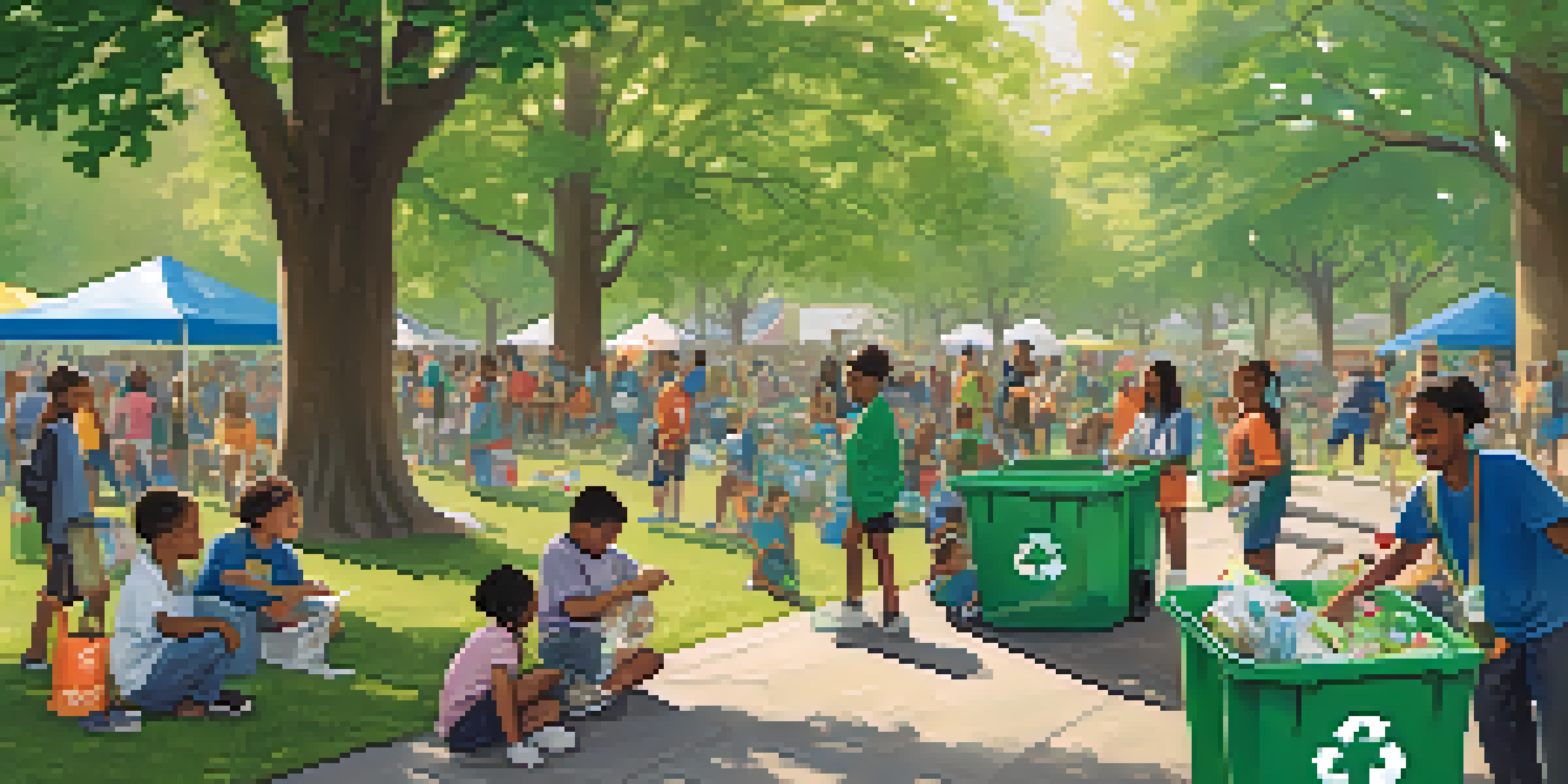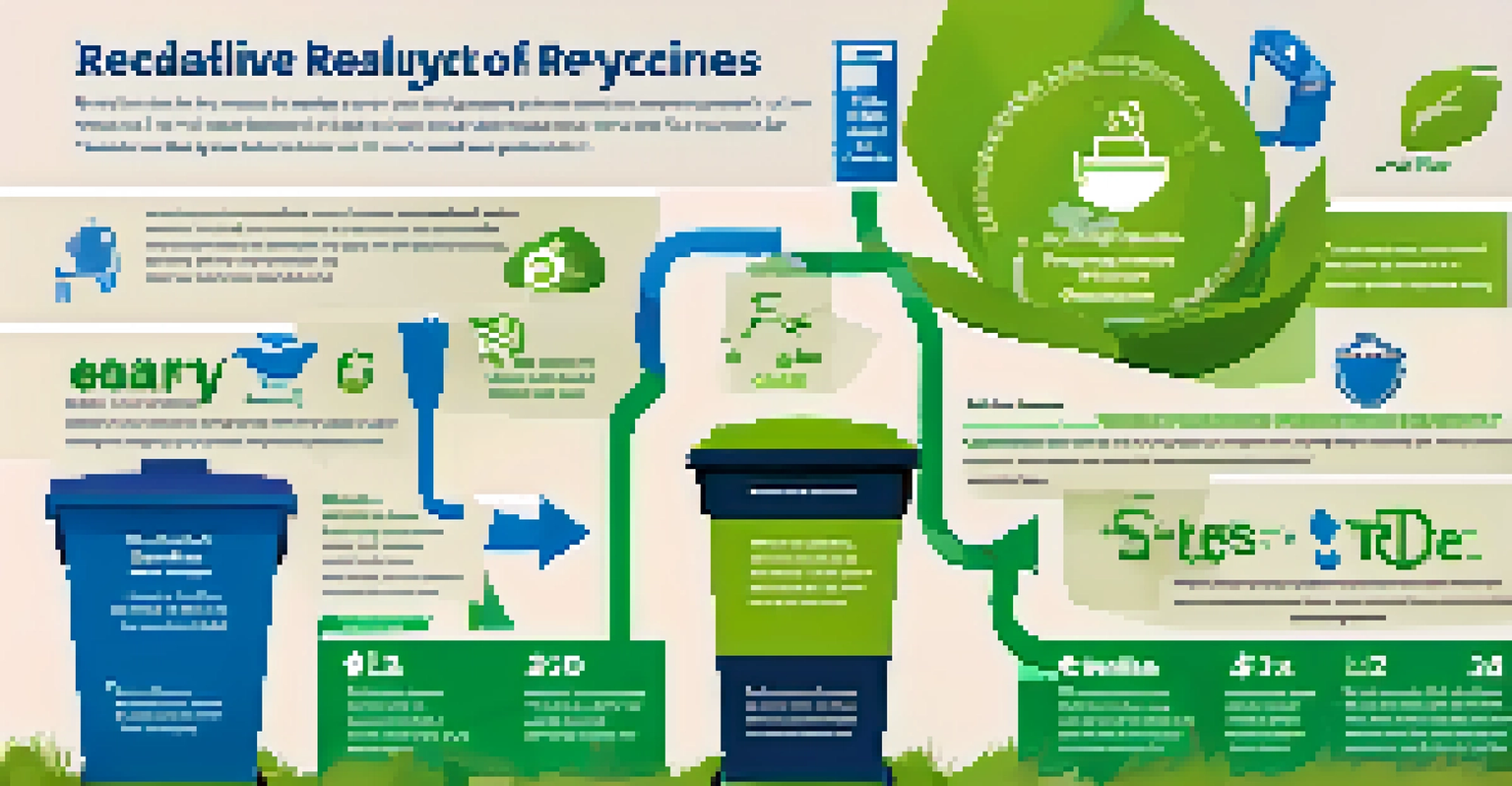Waste Management Challenges: Newark's Recycling Efforts

Understanding Waste Management in Newark
Waste management in Newark is a pressing issue that affects the community and environment. With a growing population, the amount of waste generated is increasing, putting pressure on the city’s resources. Understanding the local practices and policies is essential for effective waste management and recycling efforts.
The greatest threat to our planet is the belief that someone else will save it.
Newark’s waste management system includes collection, disposal, and recycling services, but challenges remain. The city has made strides in implementing policies aimed at increasing recycling rates, yet many residents still struggle to adapt to these changes. This highlights the need for ongoing education and community engagement to improve recycling habits.
In addition to recycling, Newark faces challenges related to littering and illegal dumping. These issues not only create an unsightly environment but also pose health risks. Addressing these concerns is crucial for a sustainable waste management strategy that supports both residents and the environment.
The Role of Recycling in Waste Reduction
Recycling plays a vital role in reducing waste and conserving natural resources. By reusing materials, Newark can minimize the amount of waste sent to landfills and reduce its carbon footprint. This not only benefits the environment but also promotes a circular economy where resources are used more efficiently.

In Newark, recycling efforts are supported by various programs aimed at educating residents about the importance of recycling. Programs include workshops, community events, and informational campaigns that provide valuable resources. These initiatives help residents understand what can be recycled and how to do it properly, thus increasing participation.
Importance of Community Engagement
Involving residents in recycling discussions fosters ownership and increases participation in Newark's waste management initiatives.
However, despite these efforts, challenges remain in achieving higher recycling rates. Many residents still express confusion about recycling guidelines, leading to contamination of recyclable materials. This underscores the need for clearer communication and more accessible resources to ensure that everyone can contribute effectively.
Barriers to Effective Recycling in Newark
One significant barrier to effective recycling in Newark is the lack of consistent access to recycling facilities. Some neighborhoods face challenges in obtaining bins or have limited collection days, which discourages participation. Addressing these logistical issues is essential to ensure that all residents have the opportunity to recycle.
Recycling is a key part of the solution to managing waste sustainably and protecting our environment.
Another barrier is the socioeconomic factors that affect residents' engagement with recycling programs. In some areas, residents may prioritize immediate needs over recycling, leading to lower participation rates. Understanding and addressing these socioeconomic challenges is crucial for creating a more inclusive recycling initiative.
Lastly, there is the issue of public awareness and education. Many residents simply may not understand the benefits of recycling or how to do it correctly. Tailoring educational materials to different demographics within Newark can help bridge this gap and encourage a more robust recycling culture.
Community Engagement and Recycling Initiatives
Community engagement is key to the success of Newark's recycling initiatives. By involving residents in discussions and decision-making, the city can foster a sense of ownership and responsibility towards waste management. Engaged communities are more likely to participate in recycling programs and advocate for sustainable practices.
Various organizations and local groups are actively working to promote recycling efforts in Newark. Collaborations between the city and community organizations have led to successful events such as clean-up days and recycling drives. These hands-on experiences not only raise awareness but also bring residents together, strengthening community bonds.
Barriers to Recycling Participation
Logistical issues and socioeconomic factors hinder residents' engagement in recycling programs, highlighting the need for accessible solutions.
By harnessing the power of community, Newark can create a more effective and sustainable recycling program. Engaging residents through volunteer opportunities, educational workshops, and feedback sessions can help tailor initiatives to better meet the community's needs and overcome existing challenges.
Innovative Solutions for Recycling Challenges
To tackle the recycling challenges faced by Newark, innovative solutions are necessary. Technology can play a significant role in improving waste management systems, such as using apps to track recycling schedules and provide alerts. These tools can help residents stay informed and engaged with recycling efforts.
Additionally, introducing incentive programs can motivate residents to recycle more effectively. For example, offering rewards or discounts for consistent recycling can encourage participation and foster a sense of competition among neighborhoods. This approach has proven successful in other cities and could be adapted for Newark.
Furthermore, partnerships with local businesses can enhance recycling efforts. Collaborating with businesses to establish recycling drop-off points or sponsorship of community events can create a more comprehensive recycling network. This collective effort can amplify the impact of recycling initiatives across the city.
Success Stories from Newark's Recycling Programs
Despite the challenges, there are success stories emerging from Newark’s recycling programs. Community-led initiatives have resulted in increased awareness and participation in recycling efforts. These grassroots movements show the power of local action in driving meaningful change within neighborhoods.
For instance, some schools in Newark have adopted recycling programs that teach students the importance of sustainability. These educational initiatives not only empower the next generation but also encourage families to adopt similar practices at home. Such efforts demonstrate how education can lead to long-lasting behavioral changes.
Innovative Solutions for Recycling
Implementing technology and incentive programs can enhance recycling efforts and motivate Newark residents to participate more actively.
Additionally, partnerships with local nonprofits have led to successful recycling drives that engage residents. These events often provide a platform for community members to learn, connect, and take action towards a more sustainable future. Celebrating these successes can inspire others to join the movement and contribute to Newark's recycling goals.
Looking Ahead: Future of Recycling in Newark
As Newark looks to the future, it’s essential to build on the foundation of existing recycling efforts. Continued investment in education, infrastructure, and community engagement can lead to improved recycling rates and waste management practices. The city has the potential to be a leader in sustainable practices if it addresses the existing challenges head-on.
Moreover, fostering collaboration among government, businesses, and residents can create a holistic approach to waste management. By working together, these stakeholders can develop innovative solutions that benefit everyone involved. A united front can amplify the impact of recycling initiatives and lead to more significant changes.

Ultimately, the future of recycling in Newark hinges on the commitment of its residents and leaders. With ongoing education, community involvement, and innovative strategies, Newark can overcome its waste management challenges and pave the way for a more sustainable future.